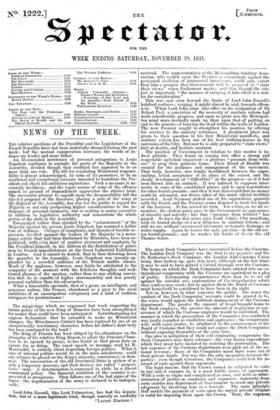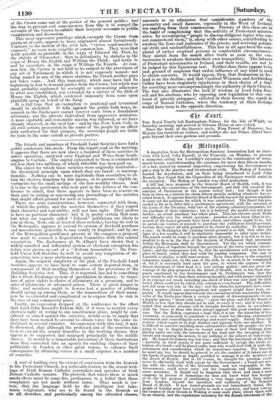The great Dock Companies have succumbed before the. Customs. The
London. Dock Company was the first to cry peccavi; and the St. Katherine's Dock Company, the London Anti-Customs Union being thus broken up, gave way next, although on the late trials it may be said to have gained a virtual triumph over the Customs. The terms on which the Deck Companies have entered into an ex- trajudicial compromise with the.. Customs are equivalent to a plea of guilty. Extenuating circumstances there may be to set off against the suicidal act ; explanations of Cie irregularities which they confess may exist ; but as against them the Board of Customs must henceforth be considered to have been in the right.
Not so, however, in what concerns the public. The worse the conduct of the Dock Companies' servants could be proved to be, the worse would appear the habitual management of the Customs department. The greater the amount of fraud brought home to the Dock employes, the greater the amount of negligence or con- nivance of which the Customs employes would be convicted. The manner in which the prosecution of the Companies was conducted was justly regarded as vindictive and oppressive ; the compromise will, with equal justice, be attributed to the consciousness of the Board of Customs that they could not expose the Dock Companies without exposing themselves at the same time.
One plea in mitigation of their self-criminating compromise the Dock Companies may fairly advance—the very heavy expenditure which they must have incurred by resisting the prosecution. The law expenses of the Customs department were paid out of the na- tional revenue ; those of the Companies must have come out of their private funds. Nor was this the only inequality between the, parties: even though victorious, the Companies could look for no award of costs against their opponents. The legal maxim, that the Crown cannot be subjected to costs' in any suit it engages in, is a most fertile source of oppression.' With a code so vague and complicated as ours, and with an admi- nistration of justice so cumbrous and expensive, immunity from costs enables any department of Government to crush-any private, advsrsary by involving him in a lawsuit. The same principle: that entails the payment of costs upon the unjust private litigant- is valid for imposing them upon the Crown. True, the expenses. of the Crown come out of the pocket of the general public ; but the way to prevent evil consequences from this is to compel the. servants of the Crown to submit their; lawyers' accounts to public examination and discussion,, This most oppressive privilege which-exempts. the Crown from, payment of costs, appears to have originated almost fortuitously. Contrary to the maxim of the civil law, "victus condemnatur in expensis," no costs were exigible at common law. They were first made payable to plaintiffs, in the reign of Edward the First, by the statute of Gloucester ; then to defendants, by statutes in the reign of Henry the Eighth and William the Third; and lastly to and by executors, in the reign of William the Fourth. At com- mon law, the Crown is not held to be subject to the provisions of any act of Parliament in which it is not expressly named: not being named in any of the above statutes, the Crown neither pays nor takes costs. And this immunity, which may have had its beginning iu fear to demand justice from the Crown, but which was most probably confirmed by oversight or unreasoning adherence to what was established, was extended by a statute of the 24th of Henry the Eighth, which conferred immunity from costs upon plaintiffs suing on behalf of the King.
It is full time that an exemption so irrational and tyrannical should be abolished. It tells against the public both ways, in-
asmuch as the Exchequer cannot recover costs from a fraudulentadversary, nor the private individual from oppressive ministers.
A more equitable and reasonable maxim was followed, as we have already observed, in the civil law : and.by the New York Code, in all civil actions prosecuted in the name of the people by an officer duly authorized for that purpose, the sovereign people are liable for costs to the same extent as private parties.



























